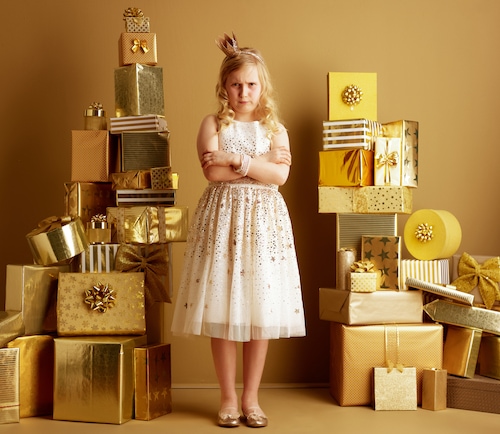As parents we want our kids to feel the magic of the season and the spirit of giving but they just want MORE STUFF! And when they get the stuff? Tears and meltdowns and “It’s not fair!” when it’s all over.
How can we help our children appreciate the giving as well as the receiving? How can we help them to understand that people are more important than ‘stuff’?
Here are 3 things you can do that will help:
1. Give an experience.
When my children were little, my brother-in-law, their Uncle Ezra, would give them an EZ Pass for Christmas. The EZ PAss could be traded in for the fun activity of their choosing. A day at the Science Centre followed by pizza ordered in and a sleepover? Way better than any present. This might be harder with COVID restrictions this year, but you can still create a magical experience.
Treat your child to time spent together doing something a bit out of the ordinary. Make a special ticket for the experience. Some ideas: a date with you, an activity in nature, an afternoon at home doing fun things together. Feel free to borrow a catch-phrase from our family. We used to ask the kids, “What’s most important?” and we taught them to answer, “People not stuff!”
What would your child really like to do with you? Giving an experience as a present will teach your child it’s not all about the stuff. They’ll see the holidays are about family time and loving each other.
2. Help them give a present.
If you want your child to value giving at holiday time, help them give a present. Children get VERY excited about giving presents when they are involved in coming up with an idea and executing it. If they have a sibling, they can make a toy for their brother and sister. Not only does this let them experience the joy of giving, it also helps lessen sibling rivalry.
One year my oldest son made his brother a pink paper-mache piggy bank when they were about 9 and 6. The little guy- who is now a 6’3” 17 year old- still has the piggy bank in his room.
No sibling? Make a present for a parent, a teacher or a neighbour. No time or creatively challenged? You can help them choose a present at the store (and hopefully they can contribute financially.)
When children are involved in thinking of and making a present, they ‘catch’ the spirit of giving.
3. Welcome all feelings.
We need to empathize when our child is crying that there aren’t any more presents, or it’s not fair, or it’s not what they wanted. Even if they’ve opened a bounty of gifts and we’re scared that they are entitled and ungrateful, we need to welcome all feelings. (hint: This is NOT the time to teach or try to get them to appreciate everything they have.)
We don’t have to agree to empathize. This is the feeling our child is having and it is real. The feeling will pass only when your child feels understood, and they have had a chance to process their feelings. After the big feelings subside, you can talk about the upset.
Try this:
- Empathize with your child’s feelings, even if you don’t agree. “You wish you could open more presents. It’s so hard!”
- Show you understand. Try to put yourself in their shoes. “You love presents so much! It feels like you can never have enough.”
- Welcome the big feelings or the tears. Don’t try to talk them out of it or fix it.
- Know that when the feelings are processed they will pass. Your child will see that they can survive the end of presents (or whatever it is) and be okay again. This is how they develop resilience.
- When the storm passes? You have an opportunity to talk over the upset.
Your child may be upset about something that seems small or unreasonable to you, but they are using it to unload all the feelings that have been building up over the action-packed and emotional days that preceded it. The tears are a chance to process everything.
And remember that this is all normal. Your child WILL learn to smile and say “Thank you” someday even if they hate the present.
You might be scared now that they are ungrateful and entitled. It’s age appropriate for small children to always want more. You are modelling what’s important and supporting them as they learn they can handle not getting everything they think they want. My kids are teenagers now and it’s hard to get them to tell us even one or two things they want for Christmas.
Give the gift of an experience together to remind children that “people not stuff” is what’s important. Help them feel the joy of giving by making a present for a sibling or someone else in their lives. Remember that all feelings need to be acknowledged. Even the ones that feel difficult and unreasonable.
Leave a Reply
"How To Stop Yelling At Your Kids"
FREE TRAINING
Ready to transform your parenting experience? Bid farewell to losing your cool and the guilt that follows, as you learn effective strategies to replace yelling with composure, creating a more joyful and relaxed atmosphere for both you and your children.
Access the Free Training
Take the next step forward!
Book a free consult call
Sign up below for a free short consult to learn how we can help you to become the parent you want to be.
Free e-course
How To Stop Yelling At Your Kids

THANk YOU!!!
Hey Sarah, We can’t wait for your workshop in January!
Great article – just shared it on my Facebook page!
Awesome!!! Excellent guidance abd I feel seen in my experience as a parent